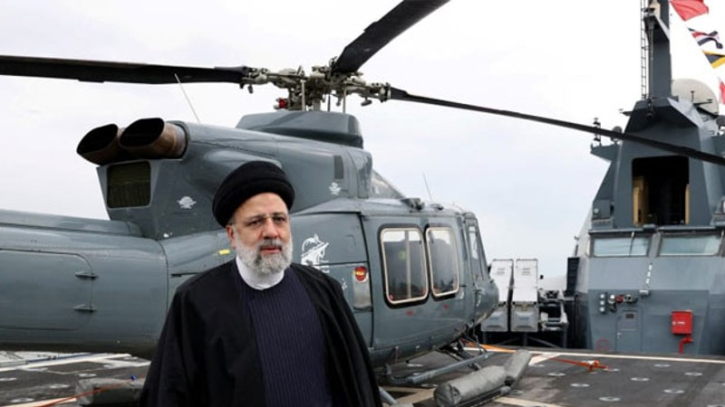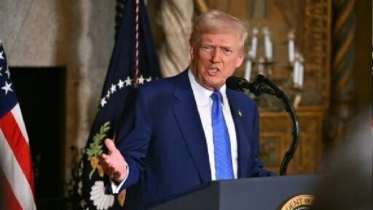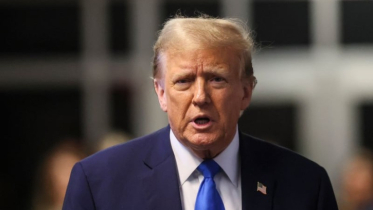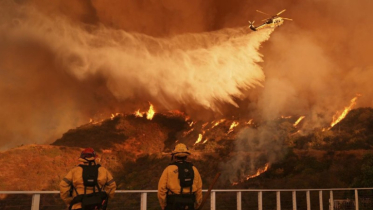
Iran’s President Raisi declared dead in helicopter crash
Iranian President Ebrahim Raisi was declared dead on Monday after rescue teams found his crashed helicopter in a fog-shrouded western mountain region, sparking mourning in the Islamic republic.
"The servant of the Iranian nation, Ayatollah Ebrahim Raisi has achieved the highest level of martyrdom while serving the people," state TV declared, showing pictures of Raisi as a voice recited the Koran.
The ultraconservative Raisi, 63, had been in office since 2021, during a time that has seen Iran rocked by mass protests, economic crisis deepened by US sanctions, and armed exchanges with arch enemy Israel.
Condolences came in from Palestinian militant group Hamas, Lebanon's Hezbollah, and from Syria, all members of the so-called Axis of Resistance against Israel, at a time of high Middle East tensions over the Gaza war.
Supreme leader Ayatollah Ali Khamenei urged Iranians late Sunday, as the search was still ongoing, to "not worry" about the leadership of the Islamic republic, saying "there will be no disruption in the country's work."
Under the Iranian constitution, first vice president Mohammad Mokhber, 68, should replace Raisi until presidential elections are held within 50 days.
Mokhber's interim appointment requires the approval of Khamenei, who has the final word in all state affairs.
Killed alongside Raisi were Foreign Minister Hossein Amir-Abdollahian, known for his fierce anti-Israel sentiment and skepticism of the West, and seven others, including the pilot, bodyguards, and political and religious officials.
Iranian authorities first raised the alarm on Sunday afternoon when they lost contact with Raisi's helicopter as it flew through a fog-shrouded area of the Jolfa region of East Azerbaijan province.
Raisi had earlier met Azerbaijan's President Ilham Aliyev on their common border to inaugurate a dam project.
On the return trip, only two of the three helicopters in his convoy landed in the city of Tabriz, setting off a massive search and rescue effort, with multiple foreign governments soon offering help.
Interior Minister Ahmad Vahidi at first spoke of a "hard landing" and urged citizens to ignore hostile foreign media channels and get their information "only from state television."
Army, Revolutionary Guard, and police officers were involved in the search as Red Crescent teams walked up a hill in the fog and rain as rows of emergency services vehicles waited nearby.
Muslim faithful across the majority Shiite nation started to pray for Raisi and the others who were missing.
As the sun rose on Monday, more than 15 hours after the crash, rescue crews said they had located the destroyed aircraft with nine people on board, said the Tasnim news agency.
"The helicopter has been found," said Iran's Red Crescent chief Pirhossein Koolivand. "The situation is not good."
He later confirmed that "we are in the process of transferring the bodies of the martyrs to Tabriz" and that "the search operations have come to an end."
The Iranian cabinet vowed that the government's work will continue "without the slightest disruption" and said that "we assure the loyal nation that the path of service will continue with the tireless spirit of Ayatollah Raisi," using his clerical title.
Foreign countries had been closely following the search at a time of high regional tensions over the Gaza war raging between Israel and Hamas since October 7.
Expressions of concern and offers of help quickly came from countries including China, Iraq, Kuwait, Qatar, Russia, Saudi Arabia, Syria, and Turkey.
US President Joe Biden was briefed, an American official said on condition of anonymity, and the European Union activated its rapid response mapping service to aid in the search effort.
Raisi had in 2021 succeeded the moderate Hassan Rouhani, at a time when the economy was battered by US sanctions over Iran's contested nuclear programme.
Iran saw a wave of protests in 2022 triggered by the death in custody of Iranian-Kurdish woman Mahsa Amini in September after her arrest for allegedly flouting dress rules for women.
In March 2023, regional rivals Iran and Saudi Arabia signed a surprise deal that restored diplomatic relations.
The Gaza war sent tensions soaring and a series of tit-for-tat escalations led to Tehran launching hundreds of missiles and rockets directly at Israel in April this year.
In a speech hours before his death, Raisi emphasised Iran's support for the Palestinians, a centrepiece of its foreign policy since the 1979 Islamic revolution.
"We believe that Palestine is the first issue of the Muslim world," said Raisi.
Hamas expressed its condolences for Raisi, an "honourable supporter" of the group, while Hezbollah mourned him as "a protector of the resistance movements.


























